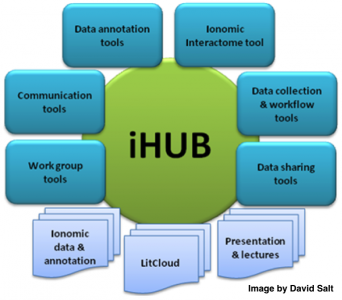Ensuring long-term access to the Ionomics Hub (iHUB)
Posted on 13 September 2016
Ensuring long-term access to the Ionomics Hub (iHUB)
 By Toni Collis, Applications Consultant
By Toni Collis, Applications Consultant
The Ionomics Hub (iHUB), a collaborative international network for ionomics, is a science community web portal that promotes knowledge extraction and reuse of ionomic data. The iHUB contains ionomic information on over 300,000 plant and yeast samples. Ionomics is the measurement of the total elemental composition of an organism which coupled to genetics provides a powerful tool to understand important biological processes and problems. A better understanding of the mechanisms regulating the ionome offers potentially new approaches to manipulate such agriculturally important traits as salinity tolerance and mineral nutrient efficiency to develop crop varieties that are more resilient to the predicted impacts of climate change on soil fertility. Further, it will allow improvement in crop yields in a more sustainable manner to deliver the yield gains required to meet future population growth. Together with the Software Sustainability Institute, David E Salt, the Director of iHUB and Professor of Genome-Enabled Biology in the Division of Plant and Crop Science based at the University of Nottingham wants to ensure that this valuable resource continues to operate and is maintained for years to come.
A major challenge to the reproducibility of science is the provenance of data. Sharing this data also facilitates the research of others, ensuring that multiple research groups can access quality data with good provenance to build scientific knowledge benefits us all.
The largest ionomics project in the world is provided by the iHUB service: a complete set of tools and resources for formalised data collection, storage and discovery to enable data reuse and publication (see figure below). This service ensures that the ionomics community continues to collect data on an ongoing basis, and also secures the data to allows its continued reuse for years to come. For example, the ionomics group of Professor Salt have contributed ionomics data on over 200,000 Arabidopsis thaliana (thale cress) leaf and seed samples. The data this generates needs to be stored with all the relevant metadata (e.g. line name, catalogue name, soil batch, watering system), within the iHUB infrastructure that up until now has been hosted by the Purdue University CyberCenter. However, with the closure of the CyberCenter and the move of the Director of the iHUB to Nottingham, it is now time for the iHUB to find a new home, and ionomicshub.org and all its data will be moving to the University of Nottingham. To help with this migration the Institute, in partnership with Purdue and Nottingham Universities, are developing a migration plan to advise and support University of Nottingham in the migration of the iHUB.
The Software Sustainability Institute will be looking at how best to perform the migration and advising the University of Nottingham on the best setup to ensure a seamless transfer for users. The second stage of our collaboration will be to assess the technology the platform is currently based on and suggest potential changes to ensure the long-term sustainability of the iHUB. At over 73,000 lines of code, this is no simple task, with Java and Database functionality woven together in one bespoke package for the ionomics community.
Together with the University of Nottingham, the Institute hopes that this will help ionomics scientists in the future and ensure the security of this data for all in the future.
